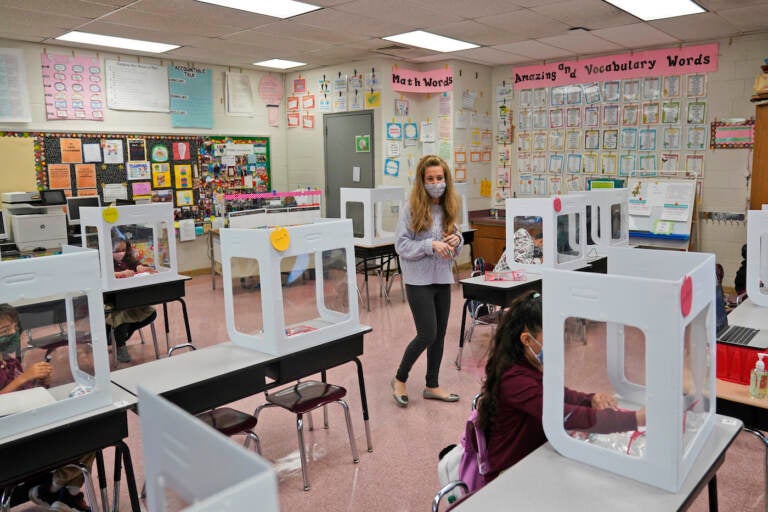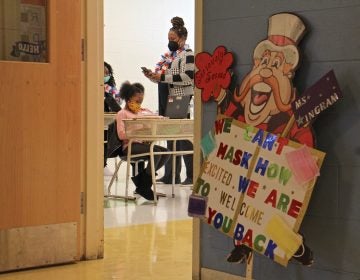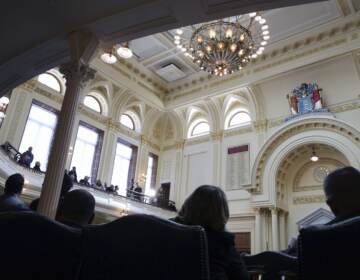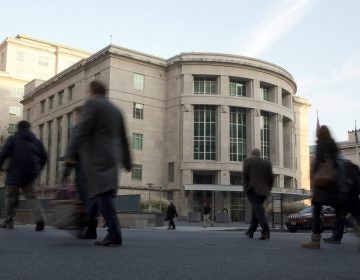Oral arguments in N.J. school desegregation trial set to begin
Plaintiffs will argue that the state has not done enough to properly integrate public schools.

File photo: Maria Mirkovic works with some of her third graders in her classroom at Christa McAuliffe School in Jersey City, N.J., Thursday, April 29, 2021. (AP Photo/Seth Wenig)
Oral arguments in a New Jersey school desegregation case, delayed by the coronavirus pandemic, begin on Thursday.
Plaintiffs, including the Latino Action Network and the NAACP NJ State Conference, will argue that the state has not done enough to properly integrate public schools and that the state should be held liable.
“What we’re trying to do here is make sure that all kids in New Jersey have access to equal opportunities in education,” said Christian Estevez, president of the Latino Action Network. “And we do not accept the idea that providing funding alone is enough to create equality.”
“We need something beyond separate but equal, we need real quality, we need real integration here, for our kids,” he said.
New Jersey has some of the most segregated schools in the nation, a University of California Los Angeles study found.
According to the consolidated brief filed in January, between 2015 to 2016 and 2019 to 2020, 47% of Black and Latino students attended schools that were 90% non-white. And 64% of Black and Latino students attended schools that were 75% non-white.
Conversely, 30% of white students attended schools that were more than 80% white. And 40% of white students attended schools that were more than 75% white.
“This is a fact that should not be accepted or tolerated and, as a matter of both constitutional and statutory law, the State is responsible for addressing it by taking appropriate steps to integrate its public schools,” wrote Lawrence Lustberg, the plaintiffs’ lead lawyer.
The plaintiffs also argue that schools are segregated along poverty lines.
Estevez said school segregation hurts all students, not just those from Black and Latino neighborhoods. He said the case is a first step toward remedying socioeconomic and racial inequities in education.
“Segregation also hurts white students because it creates a separation between different students and perpetuates stereotypes between them,” Estevez said. “And…in this country where people are so polarized and have all these misconceptions about each other, it benefits everybody if our kids can grow up next to each other, learn about each other, and respect each other’s humanity from an early age.”
In the state’s pre-trial arguments, deputy attorney general Christopher Weber called the plaintiffs’ claims “laudable,” yet “ambitious.”
“Plaintiffs’ claims that our system of public education, by its very nature, violates the constitution, is wholly unsupported by the record on which they rest,” Weber wrote. “Rather than addressing the particular circumstances present in any one school or district, plaintiffs fashioned a statewide challenge based entirely on a limited set of data points relating to a limited number of school districts at a discrete point in time.”
“Critically, plaintiffs do not allege or present any evidence that New Jersey’s students are unprepared for entry into society on a statewide level,” Weber added.
Last month, the state Senate Education Committee narrowly approved a bill that would create a Division of School Desegregation within the Department of Education. If signed into law, the division would be tasked with identifying instances in which students are functionally, though not legally, segregated along racial and socioeconomic lines, and “to ensure better integration and a more diverse enrollment in public schools,” according to the bill, which was sponsored by Sen. Joe Cryan (D-20).
If the judge rules in favor of the plaintiffs, the state would be liable, but would not immediately be required to create solutions, Estevez said.
Opening arguments begin at 10 a.m. on Thursday.
WHYY is your source for fact-based, in-depth journalism and information. As a nonprofit organization, we rely on financial support from readers like you. Please give today.







